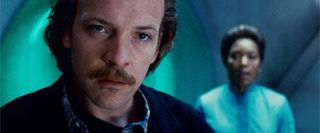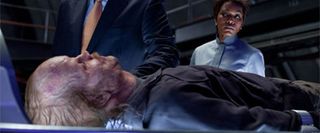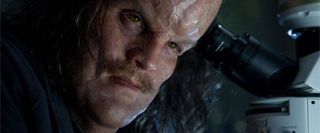Exclusive Interview: Green Lantern's Peter Sarsgaard

If you haven’t already figured it out, Martin Campbell’s Green Lantern uses a lot of CGI. A great deal of the film, from the hero’s suit to the various aliens on planet Oa, was constructed during post-production. There is one thing in the movie, however, that’s very, very real, and that’s Hector Hammond, played by Peter Sarsgaard.
In the film, Hammond is a brilliant scientist who is chosen to perform an autopsy on the first alien life humanity has ever found. During the operation, however, he becomes infected with something that gives him incredible psionic powers. The downside? It also causes his head to grow to an enormous size.
During the press day for Green Lantern, I was fortunate enough to sit down with Peter Sarsgaard one-on-one to talk about his role in the film. Check out the interview below in which the actor discusses how the prosthetic head affected his performance, Hector’s look even before he gets infected, and the character’s changing backstory.
One thing I really, one thing I’ve kind of found is a prevalent theme in comic book movies and in books is that characters seem to, there seem to be a lot of father issues. In this film it’s kind of two-headed, because you have both Hal and Hector kind of affected by it. I was wondering if maybe you could talk about why you think that is.
I think it’s interesting, because boys are usually the central characters and I guess boys frequently have issues with their fathers. Also you think of the era that a lot of these comic books were coming out of and the way that the role that men had in the sort of family life, it was sort of more satellite during that time. I think a lot more people had daddy issues then.
Just kind of bridging off of that, obviously Hector, and even before he goes through his transformation, is a bit disturbed, and a lot of that aggression is toward his father, but obviously the infection by Parallax allows him to act on his impulse. Do you think that if he hadn’t actually been infected, would it have come out eventually?
No, I think it’s sort of one of the greatest things that’s ever happened to him in his life. He needed to express himself. This gave him the ability to express himself. I really always wanted the event that happens of him getting infected to be something that was both things, a negative thing and a positive thing at the same time.
CINEMABLEND NEWSLETTER
Your Daily Blend of Entertainment News
I guess, because he is a psychologically driven character, how would you personally get into him, what kind of research did you do, did you look inwardly at all?
Yeah, I mean, you know. It’s always hard to say where things come from, sometimes they just come kind of impulsively. I’m an actor that acts on impulse a lot of the time, but I did think about the creatures that he was studying, about what his job was, I sort of thought that said a lot about him. You know, that he was studying these creatures that live in hostile environments. He’s a kid who grew up in a hostile environment. I also thought of him as somebody who was fourteen, like an adolescent, and so I just tried to get in touch with being an adolescent.

How much does wearing the makeup instead of going through the CGI process help just getting into the mindset?
If I had to, I couldn’t have done it as well with CGI. The physical reality of it, also what it did, I walk a certain way, I talk a certain way, I did vocal things based off of the size of my head because that’s what determines what our voices sound like frequently. But also just the way people treated me. They look at me on set and people would try to talk to me and it was very difficult. So I was kind of in my own world, having to stay still, calm, cool, you know, all of that I’m sure affected the character.
I guess, for one, I actually heard that, when I talked to Blake Lively at WonderCon she said that there was an incident with you and your daughter.
Yeah, my daughter came in and it was a day where I was just wearing practically nothing, like, the beginning, maybe with just a little thing on my forehead or something. It hadn’t even started yet. I literally sat in the chair, they wiped my face off, and my daughter was like, “I’m leaving.” And I always knew, we weren’t gonna expose her to it, it’s weird.
Are you gonna let her see the film?
No.
Is that just an age thing, will you let her see it eventually?
Well as her dad, it looks so bizarre. I don’t think it’s, there would be no reason to show it to her. I wouldn’t show it to her, she’s only four and a half years old.
When you first signed on to the project, if you look at the comics, Hector’s head gets to go to pretty extreme levels. When you were shown the concept art, how extreme was it, when you first signed on?
It was pretty extreme. It always looked vaguely like this. One interesting side note was for some reason, they had used Philip Seymour Hoffman’s face, so, maybe Phil has a big head, and they had kind of added to his face. So when I was looking at the art it wasn’t me, it was Phil Hoffman. So that was strange.

Was there kind of a, did you feel there was a cap where, of the circumference of your head where you just didn’t want to get it to a certain length?
Yeah, there was one that we put on that was just too big. It’s a difficult thing to pull of because we wanted it to look like something physical, that was biological, that was in some way connected to real anatomy. At the same time, we knew it looked really repulsive and I’m trying to act through it and not just have people want to throw up while they’re watching it. With some of the heads that looked more like they do in the comics, that are a smooth round head, I looked like I could be on Saturday Night Live. It was impossible to pull off.
Was there ever a concern that what you were going through was going to not play, that it was going to seem too goofy?
Yeah, I mean we were always concerned with that. I tried, I only had say five percent input in terms of that look. The way I look in the beginning of the film is more...
How did you come to that decision with the mustache and the receding hairline?
I don’t know. I just, I looked back at all the different ways that Hector looked throughout the course of the comic book and it changed so much. There are versions of Hector where he looks like Magnum PI, I mean a big tough guy with a big moustache. So I just wanted to get straight which version of the character we were doing and once I had that, I just kind of daydreamed.
There is actually, just getting back to the comics, there is a pretty significant change between the comics and this take on the character. Obviously, for example, Ryan Reynolds, there’s a history of kind of how he got it, but for example, Hector Hammond in this isn’t a petty criminal, so did you find that more freeing? Did you wish that there was more of that professor kind of background for the character?
For me, the story that Martin wanted to tell is the only story that I concerned myself with. It’s not my job to decide which of the source material winds up in the movie, and a movie this big, the actors don’t decide that type of thing. So I guess what was on the page, and I was aware of all the different versions of what Hector had gone through, but let’s put it this way, Heath’s Joker, I didn’t see any, there’s no Joker like that in any of the Batman comics. You want to do something, you want to have the bravery to do something original. And there will always be people who are like, the classicists who are like, “No, but it’s got to have this.” In life, there are people like that attached to every single thing that there is. These are the same people that are like, still playing vinyl.

Another thing that I’m just curious about is, you went through, it was eight hours of makeup. Is that the right number?
No, four hours of makeup.
Four hours, but you still had to be on set that early.
Four hours of makeup, and then an hour to take it off.
But how do you, that’s obviously a lot of work, it’s a lot of sitting on chairs, how do you prevent that, I guess almost a level of exhaustion from...
It’s tiring. I go in, I get picked up at two-thirty in the morning, I get there at three. I wait four hours, go through it, ready to work at seven, work all day long for twelve hours, and get it taken off for an hours, go home and go to sleep, and do the same thing again. I mean it’s exhausting. The more delirium that set in with this role, the better it got.
It kinda does, because by the end of the film he does kind of seem off kilter a little bit.
Oh, a little, yeah. Just a little bit, yeah.
Another question I had was, in addition to just being the top of the head, you also had quite a bit of, going on in the neck area.
Oh no, it went down to here [moves hand to the top of his chest].

Oh it went all the way down?
It went all the way down to my nipples. They kept it off the nipples.
I guess for when they were removing the glue.
Yeah, yeah. And the chest hair was...
Did you have to shave your chest?
I did. I shaved not my, down here, but the top. It’s kind of weird.
So, did that affect your ability to deliver dialogue, did you have to do a lot of ADR work?
No, it gave a certain quality to the way I talked. I like those kinds of things. I like anything that is like an obstruction, something that I have to act through is good. If all the circumstances of acting are made to easy, then there’s no grain of sand to make the pearl. So it’s necessary in some way.
I also know, in addition to your book you’re working on, you’re going to be doing a film with Dakota Fanning and Elizabeth Olsen. Can you talk a little bit about that?
It’s called Very Good Girls, it’s a coming-of-age story set in Brooklyn, my mother-in-law, Naomi Foner is directing it. I think, I’m not sure who else is in it, maybe Dustin Hoffman might be in it?
Yeah I think so, I think I read that. Can you talk a bit about your character?
I’m just playing a small role in it, just helping out my mother-in-law.

Eric Eisenberg is the Assistant Managing Editor at CinemaBlend. After graduating Boston University and earning a bachelor’s degree in journalism, he took a part-time job as a staff writer for CinemaBlend, and after six months was offered the opportunity to move to Los Angeles and take on a newly created West Coast Editor position. Over a decade later, he's continuing to advance his interests and expertise. In addition to conducting filmmaker interviews and contributing to the news and feature content of the site, Eric also oversees the Movie Reviews section, writes the the weekend box office report (published Sundays), and is the site's resident Stephen King expert. He has two King-related columns.
Most Popular




